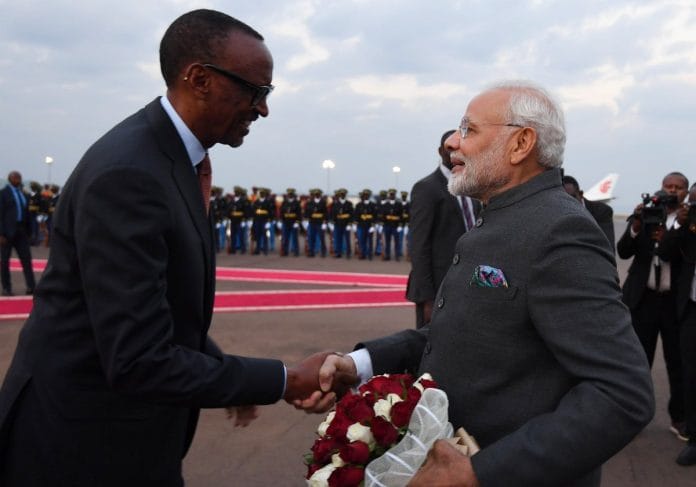Media’s reluctance to cover Africa is a possibility, but there’s the elephant in the room — Chinese rise in the continent.
New Delhi: Prime Minister Narendra Modi has returned home from Rwanda, Uganda and South Africa, where he attended the BRICS summit, after five days, logging several firsts during his African journey.
These include gifting 200 cows to a model village programme in Rwanda, where Modi was also the first Indian prime minister to visit the country.
So why is it that the blanket wall-to-wall coverage, usually associated with the PM’s foreign trips, missing this time around? Some of it can be attributed to the media’s reluctance to cover Africa as intensely as other, more developed parts of the world.
Once forged by Third World solidarity, India and Africa celebrated their struggles for independence with verbal promises and slogans. But in the new world order, in which mostly money talks, only one country seems both rich and suffused with a global vision to fill the vacuum — China.
Chinese procession in the continent
Note how Chinese president Xi Jinping strode across the continent this past week. He started off in Senegal on the west coast, flew to Rwanda in the heart of the continent, onwards to South Africa – where he met PM Modi at the BRICS summit — and is returning home via Mauritius in the Indian Ocean.
In Senegal, the goodies started flowing in after both countries signed a strategic partnership in 2016. This year, 2018, Senegal became the first West African country to join Xi’s beloved ‘Belt and Road’ project. On this trip, Xi gifted a wrestling stadium to Dakar that can seat 20,000 people and promised to build a road from Dakar to Touba costing $81.2 million.
The Chinese leader’s Rwanda journey came within 24 hours of Modi’s visit to Kigali. But while Modi gifted 200 cows and two lines of credit worth $200 million in agriculture and irrigation, China and Rwanda signed 15 agreements in civil aviation, mining, infrastructure development, among others. Beijing is already Rwanda’s largest partner, with 70 per cent of its road network built by China.
Modi’s Uganda visit was noticed in the local media because of the warm welcome he was given by the Indian community, mostly of Gujarati origin. Two lines of credit, $141 million on electricity transmission and $64 million on agriculture and dairy, were extended.
Trouble in India’s African crown?
South Africa, the jewel in India’s Africa crown, seems to have also switched sides. While external affairs minister Sushma Swaraj exulted in the past last month, travelling from Pentrich to Pietermaritzburg by train to commemorate Mahatma Gandhi’s iconic journey 125 years ago, China was busily gate-crashing into the present. Xi has promised to invest $14.7 billion in South Africa. It is already Pretoria’s largest trading partner.
Modi and Ramaphosa signed three MoUs, on cooperation in outer space research, agriculture and education, as well as on setting up the Gandhi-Mandela centre of specialisation.
Xi was the only one – not Modi, nor Russian President Vladimir Putin, nor Brazilian President Michel Temper – to be accorded the honour of a state visit during the BRICS summit.
According to South African online news portal News 24, Modi was seriously upset when the country’s National Prosecuting Authority (NPA) wrote a letter last month saying they were inquiring into charges against Modi, brought by the Muslim Lawyers Association regarding human rights violations in Kashmir.
Delhi was so upset, News 24 said, that South African energy minister Jeff Radebe had to be sent to India last month to allay its concerns. The NPA subsequently dismissed the charges.
But the PM remained angry and did not attend the BRICS Business Forum as a result, News 24 speculated.
Chinese trade in the tax haven
As for Mauritius, the old special relationship underwritten by the special terms of the tax treaty (amended in 2016) gives India a unique advantage in the Indian Ocean. But China has overtaken India to become Mauritius’ largest trading partner.
Mauritius not only celebrates the Chinese Spring Festival with much abandon, it is the first African country to start trade talks with China.
Global Times, the pro-Communist Party of China newspaper, has since sought to assuage Indian sensitivities.
“The common presence of the two countries in Africa doesn’t necessarily lead to cut-throat competition…China and Africa can complement each other…China is a significant contributor to building Africa’s infrastructure and is good at providing investment and technology, while India excels in aiding Africa in developing human resources through education, vocational training and development,” it said.
Question is, is the Prime Minister listening?







China and Africa are a good fit. China is an immense market for the continent’s minerals, energy, agricultural commodities, an exporter of economically priced consumer goods. It also has execution capacities for building infrastructure, supported by capital to fund it over the long term. The disparity in the size of the Indian and Chinese economies creates a logic that cannot be overcome by personal diplomacy. India has its valuable relationships with several African countries.